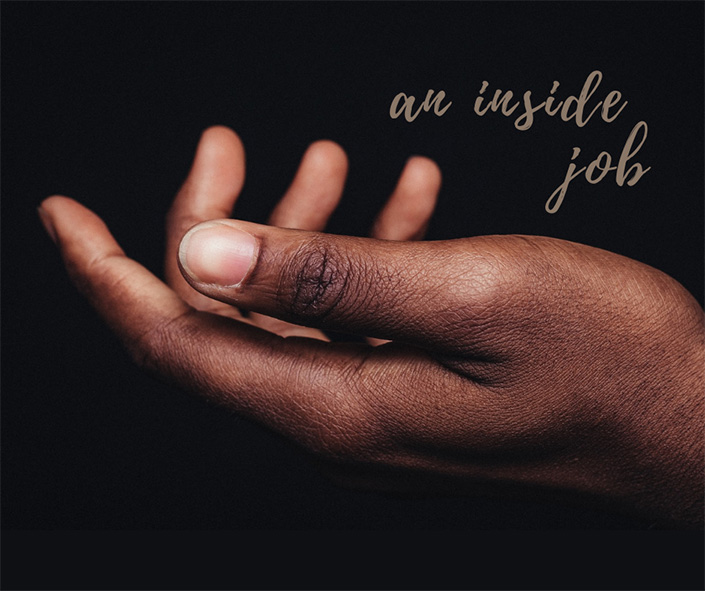Sacred Reflections


Inside Job
What we do with our money
is an inside job.
It was a few months
after I separated
from my first husband
He had brought
a beautiful set of
dining room furniture,
into our marriage
and when he left
it seemed right
that he should take it with him.
My son was two years old.
I served a pastor
in a small rural parish.
I did not have much money.
And after my husband left,
I had no table or chairs
for our family meals.
So I visited a furniture store
in nearby outlet mall.
As I browsed through their showroom
I feel in love with distressed wooden table.
Nothing about it
made it a sensible purchase.
It came with 8 matching chairs,
and a leaf to make it longer.
I had a small dining room.
Without the leaf
the table would barely fit.
And there was only enough room
for half the chairs.
And even if it fit my dining room,
it would never fit in my budget.
I left the store
realizing it may be in an outlet mall,
but it was beyond my means.
I should have gone shopping
at Value City or Walmart.
I went home discouraged,
sobered about the
cost of things,
and still in need of a table.
I don’t remember
what I used
while I sorted out
what to do next.
Maybe I set up a card table
and some folding chairs.
I just remember
feeling all this resistance
when I thought about
buying a different table.
I’d plan to go shopping
for something more affordable,
but things would come up
and I’d not get there.
I had a practice at that time
of praying every morning.
I’d sink into my prayer chair
settle into silence,
open my journal,
and write,
“What do you want to say
to me today, God?”
Then I’d listen.
Over the years
I’d come to recognize
the sound of God’s voice
in my silence.
It had led me faithfully
through some very
challenging moments
in my new call.
This voice
had counseled me
for years about my struggling marriage
and finally led me out of it.
This voice had never led me astray.
Only towards choices
that helped me love more.
As I pondered how
to resolve the need
for a dining room table,
this God voice weighed in.
One morning I
wrote in my journal,
“What do you want to say
to me today, God?”
I found myself writing out
the response I heard in my silence.
“Buy the beautiful table”
“NO!”
I found myself arguing with God.
“It’s too expensive.
it’s too big.
It’s beautiful
but I don’t need it.”
The voice I had come to trust
over so many years
persisted.
“Buy the beautiful table”
I put my journal away,
and started my day.
The next morning
I sat again to pray.
Again, God wanted
to talk to me about table.
“Buy the beautiful table”
Again I protested.
It seemed completely wrong.
Extravagant.
Unnecessary.
I began to wonder
if I was arguing with myself.
If maybe the voice
I had come to trust
as God’s voice
was really just my own,
talking me into buying something
I wanted,
but could not afford,
our justify.
This rattled me.
If I could not trust
the voice I had come to know
as God’s,
how could I continue listening
to that voice in my prayer time?
I brought this concern
to my spiritual director.
He had been listening in
on my prayer life
for years.
He knew my heart,
and where I struggled.
His spoke wisely
and faithfully into my life.
So I told him about
finding the table
and why it made no sense to buy it.
“Sometimes God asks us
to do things that make no sense,”
he gently challenged.
“Yes, … “ I responded.
I knew plenty of bible stories
about God asking people
to do crazy things.
“But, this was different.”
This was too much money.
This was not frugal.
This was the opposite
of give your money to the poor.
The extravagance of the table
was the problem.
If God has directed me
to buy a table from Walmart,
or continue using the card table,
I would have gladly complied.
I knew my bible stories.
I knew Jesus talked
more about money
than any other topic,
except the “Kingdom of God”.
I knew it was easier
for a camel
to get through the eye of the needle
than for a rich person
to get into the Kingdom of God.
I knew Jesus praised the widow
who gave all she had to God,
and rebuked the rich
who gave more money,
than she,
but only gave what they had leftover
rather than giving to God first.
I knew it was more faithful
to live poor
than rich.
At least I thought I did.
My spiritual director
broke into my ramblings.
“How long have you
been listening to that voice
you know as God’s?” he asked.
“Years,” I replied.
“Has it ever led you astray?” he asked
“No,” I replied,
not liking where this was going.
“Why would you not trust it now?” he asked
“Because it’s too much money!”
I almost shouted,
frustrated that he acted like
he didn’t know Jesus’ teachings
about wealth and money.
“What did Jesus say
when the disciples objected to Mary
using the expensive nard
to anoint Jesus’ feet?” he persisted.
“Mary’s nard cost so much more
than your table.”
“He defended her,” I acknowledged.
Suddenly I remembered
all kinds of other stories
in the bible.
About Abraham’s wealth
owning large herds of cattle.
And his grandsons
Jacob and Esau, the same.
How God gave Solomon
so much wealth
when Solomon asked for wisdom.
Of the wealthy women
who supported Jesus’ ministry.
And Boaz.
The wealthy farmer
who left extra grain in his fields
so Ruth could collect enough
to feed herself and Naomi.
I began to realize
money matters in the Bible
were not so black and white.
The beliefs I had inherited about money,
that the Church had taught me about money,
were simplistic.
Yes, money could get us into trouble.
Pursuing wealth
often distract us from God.
Protecting our wealth
often prevents us
from loving our neighbor.
But, I was realizing,
money was not really the problem.
Our relationship with money
could be problematic.
But money could also be
used in service to Love.
My table prayers
challenged my simplistic
beliefs about money:
“Wealth is bad,
poor is faithful.”
Money choices,
I was realizing,
required discernment,
prayer,
listening.
“Your God voice
has led you faithfully
for many years,”
my spiritual director
reminded me.
“I think you can trust it.”
It scared me,
and it felt extravagant,
but I found a way
to pay for the beautiful table.
I had to store
the extra leaf and
half the chairs in my basement.
A few years later,
Love led me to a new church.
My new parsonage
had a huge dining room.
Plenty of room for my beautiful table,
with all the leaves in it,
and all the chairs around it.
It also had room for small table
in the kitchen breakfast nook,
which I bought at Walmart.
This is where my son and I
ate our meals.
We never ate in the dining room.
Six months into my new call
sitting in my prayer chair,
I wrote in my journal,
“What do you want to say
to me today, God?”
“Invite 12 people
to meet every week
around your dining room table.”
And so began
the most profound ministry
of my church years.
For almost a decade
I hosted discipleship groups
around that beautiful table.
We feasted together,
prayed together,
shared the stories of our lives,
the highs
the lows
and the God Moments.
That table became sacred ground
as we were transformed
by our time in community.
And because we were transformed,
Love transformed our church,
our marriages,
our families,
our work
our relationships,
through us.
I realized Love knew,
long before I did,
why I needed that beautiful table.
Love knew that table
would become an altar.
What seemed like an extravagance
became an investment
a tool, even,
for ministry.
When it was time for me to leave that church,
I left the table.
I gifted it to my young colleague.
She had small children,
very little money,
and not much furniture.
She too used it for ministry.
“Dinner Church”
I think she called it.
These days,
when I read the money stories
in the Bible,
like the story of poor widow
who gave all she had,
and the wealthy,
who gave what did not cost them anything,
I know the money message
is not black and white.
It’s not about
being rich or poor.
My table prayers
all those years ago,
taught me,
to look deeper.
What we do with our money
is an inside job.
How we live on the outside,
reflects what lives within us.
The poor widow
could give away everything she had,
because inside she knew God.
She knew what came into her life,
came from God.
And if she gave it away,
God would bring her what she needed.
She trusted her relationship with God,
to sustain her.
Not her relationship with money.
The wealthy in this same story,
believed their wealth
came from themselves.
So, they could not give sacrificially.
They trusted their relationship with money,
to sustain them.
Not their relationship with God.
Boaz, from the Book of Ruth,
was also wealthy.
But his relationship with money differed.
He was a man of “hesed”,
lovingkindness,
the same word
used to describe God’s heart.
Boaz, like the widow,
believed he was a steward
of what God brought into his life.
He could give away what he had,
because it didn’t really belong to him.
What flows out of us,
reveals what lives within us.
What we do with our money,
how we manage our relationships,
what we do with our power,
how we respond to hate and judgement,
what we offer to those in need,
all of it,
is an inside job.
Noticing what you do with your money,
and why,
can tell you a lot about
what lives in you.
What do you notice?
Questions for Reflection?
What kind of relationship do you have with money? Are you afraid of it? Do you hold onto it? Do you give it away? Do you always feel poor? Do you trust you have enough?
What beliefs do you have about money? About wealth? About poverty? About those who have more or less money than you?
How does your relationship with God, shape your relationship with money? How does your relationship with money, shape your relationship with God?